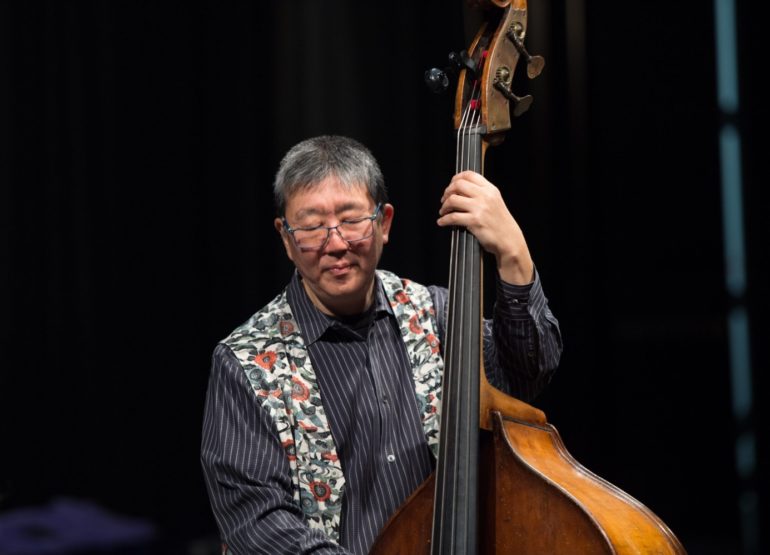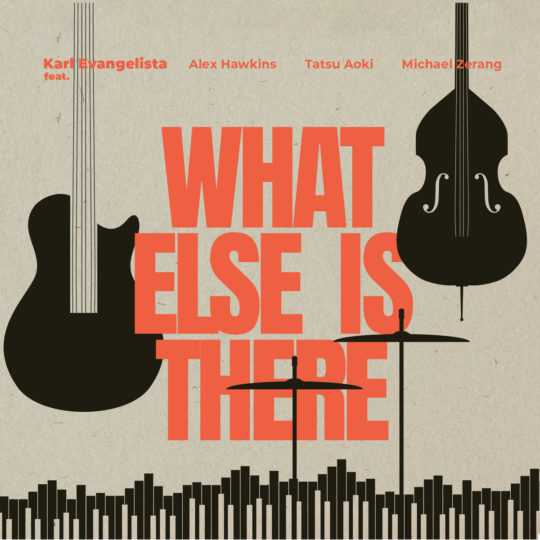Tatsu Aoki is a leading advocate for the Asian American community, as well as a prolific composer, a performer of traditional and experimental music forms, a filmmaker, and an educator. He was born in 1958 into the Toyoakimoto artisan family, and performing by the age of four. In the early 1970s, Aoki was active in Tokyo’s underground arts movement with experimental arts and music. In 1977, Aoki left Tokyo and is now one of the most in-demand performers of bass, shamisen, and taiko, contributing to more than ninety recording projects and touring internationally over the last 35 years. He is noted for being the longest associated bassist for the late Chicago legend Fred Anderson. Aoki is a Founder and Artistic Director of Chicago Asian American Jazz Festival, which celebrates its silver anniversary this year (2020). His sustained and intensified endeavors have resulted in many awards from multiple cultural and musical organizations for his cross-cultural collaborations. Of note, in 2007 he received the Milestone Award by the Asian American Institute. In 2010, he received the Chicago’s Cultural Achievement Award from the Japan America Society. And in 2014 he received the “Living in our Culture” Award from the Japanese American Service Committee. In addition to receiving the Illinois Arts Council Ethnic and Folk Arts Master Apprentice Grant for the XX years, he has received the Illinois Secretary of State Community Service Award by Asian American Advisory Council and also a Commendation for Promotion of Japanese Culture by the Foreign Ministry of Japan in 2017.
His Miyumi Project ensemble was chosen as the official musical presenters for the groundbreaking and unveiling of Yoko Ono’s installation, “SKYLANDING” in Chicago’s own Jackson Park; which also resulted in the group recording the album “SKYLANDING”, produced by Yoko Ono. And in 2017, the group contributed their unique vibe to the soundtrack of the Japanese American Incarceration film documentary: “And Then They Came for Us”, and released the corresponding album. In May of 2018, Aoki was honored as the first recipient of the “George Award”, for his years of support, recording, and performance with renowned American Jazz and soul guitarist George Freeman.
In 2019 Aoki was also awarded the Community Service award from the Asian American Coalition of Chicago for his continued leadership and contribution to the community. This year (2020), he received the United States Artists Fellowship for Traditional Arts and also the Illinois Arts Council Fellowship Award for Ethnic and Cultural Arts.
As Executive Director of Asian Improv aRts MidWest (AIRMW), an Asian American cultural arts presenter organization, Aoki has initiated and managed several programs to advance the understanding of traditional arts and community through the arts, including the annual Chicago Asian American Jazz Festival, the Tsukasa Taiko Legacy, and the Toyoaki Shamisen arts residency projects. The concept of Legacy is very prominent in all of Aoki’s music and projects. He insists on demonstrating the authenticity of the Japanese Legacy using traditional instruments such as shamisen and taiko, especially with newer contemporary applications. He performs throughout the Chicagoland, the Midwest areas, and nationally, the driving point is to instill the importance of Legacy. His traditional Japanese drumming group, Tsukasa Taiko, is profiled as one of the most active and successful taiko drumming groups in the Midwest and has also produced a number of recordings, the most recent on vinyl. Aoki’s annual Taiko Legacy performance celebrated its 16th anniversary year at the Museum of Contemporary Art in downtown Chicago and has been the largest and most popular ethnic community concerts presented at the museum. He has also restored Chicago’s shamisen lute music culture with Toyoaki Shamisen and performances with Shubukai Classical Dance. These and other projects are all components and examples of his drive to establish artist guided community participation as well as projects that have exclusive artist involvement, which raise the bar for quality and awareness of the Japanese cultural arts here in Chicago.
He continues to be based in Chicago, working internationally in a wide range of musical genres including Japanese traditional music, experimental, and creative jazz, his collaborative projects ranging from puppetry, neoclassical Japanese dance, and experimental dance films.

